
Scapegrace
E Dsus2A/D
[Intro]
E Dsus2 A/D
E Dsus2 A/D
E Dsus2 A/D
E Dsus2 A/D
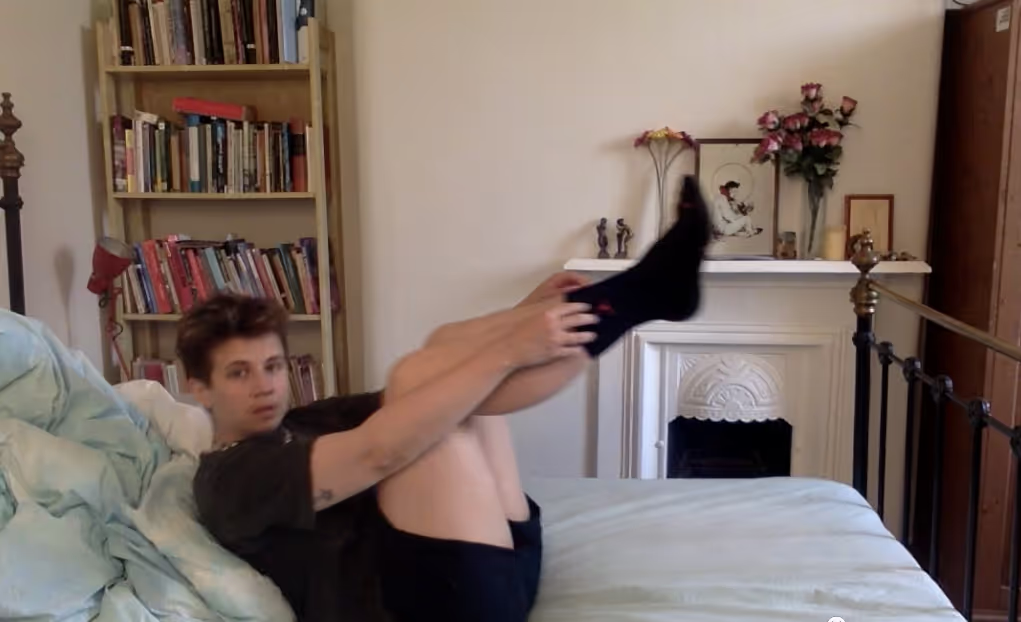
How to Do a Hollow Body Hold
To get the most out of the hollow body hold, you need to focus on form and technique. For extra support, use an exercise or yoga mat when performing this move.
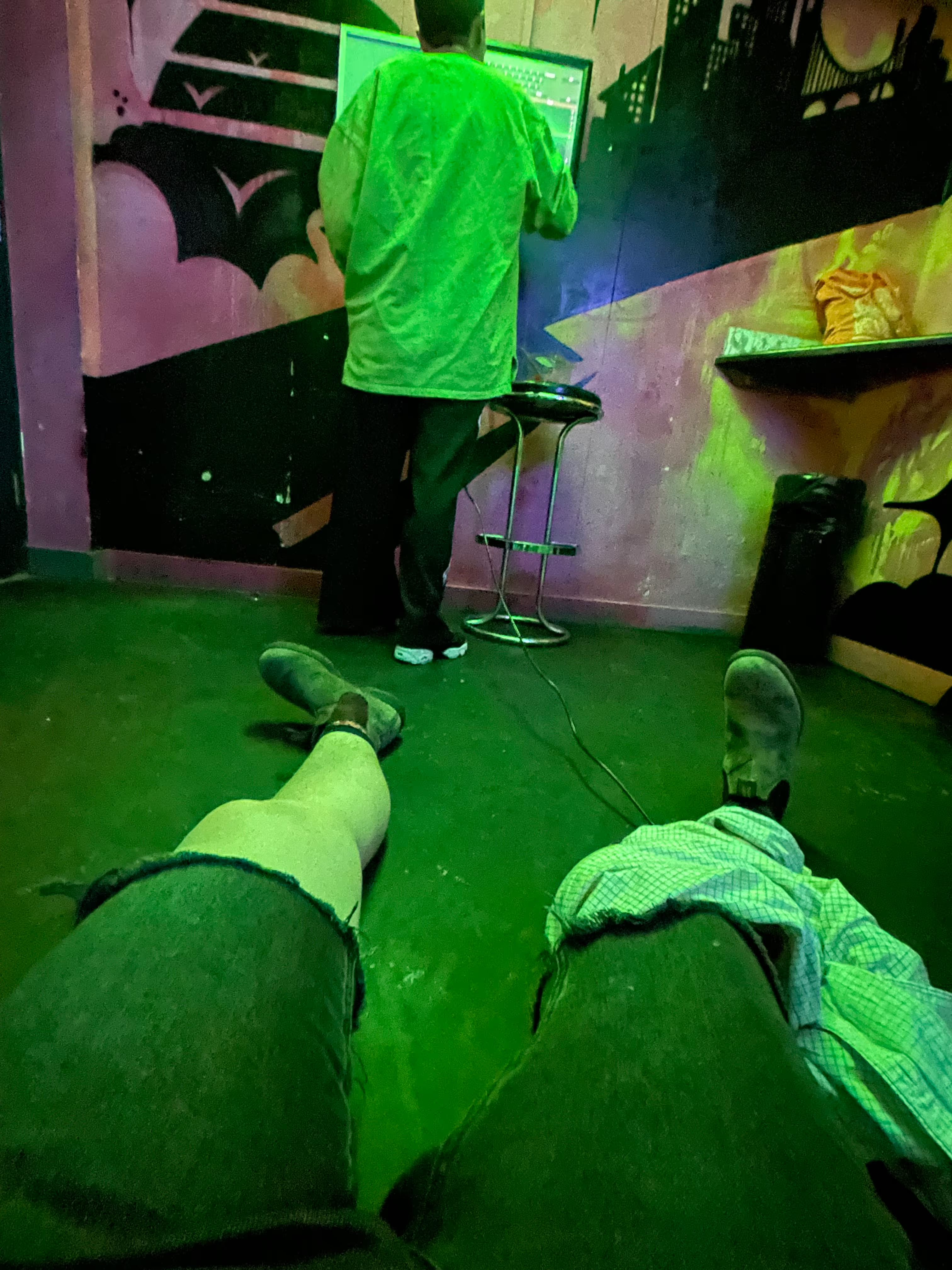
Start by lying down on the floor, legs extended, arms by your sides.
Practice contracting your abs by engaging your core and driving your lower back into the ground. Squeeze your inner thighs together to help initiate the move. There should be no room between your lower back and the floor. Keep your abs contracted and raise your legs 2–3 inches above the floor. Keep your lower back on the floor.
Raise your head off the floor (1-2 inches) and extend your arms overhead and behind you. Make sure you are pressing your lower back into the floor. Hold for 30 seconds (or as long as possible) before lowering your legs and shoulders to the floor.
Break-up Karaoke
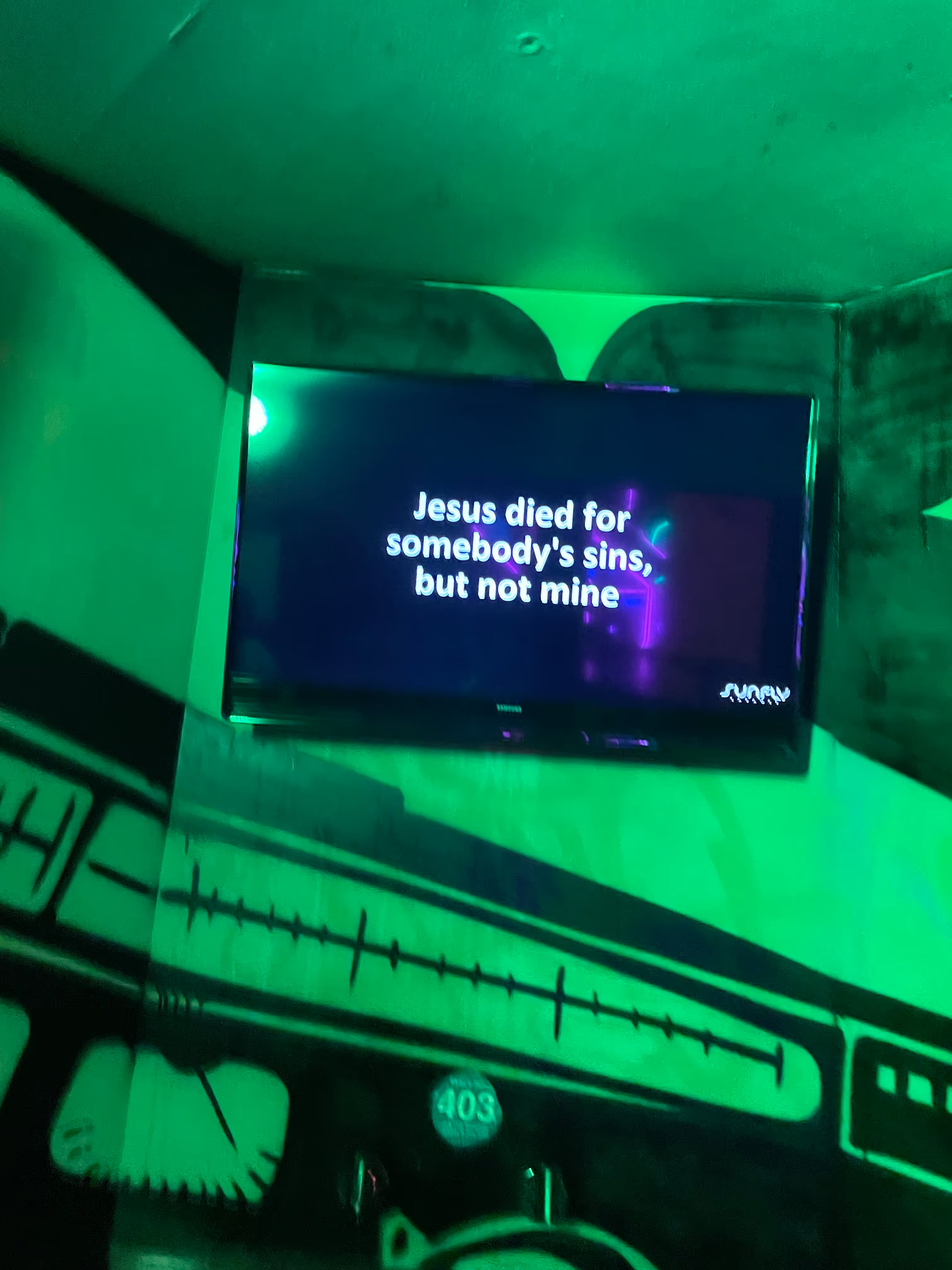
Never have I ever not dislocated my knee whilst performing karaoke to Patti Smith’s 1975 hit ‘Gloria’. It’s got me thinking maybe he did die for my sins. Cos never have I felt so smited. The first time I fell, like a Jenga tower with the last brick pulled out of it, was in Finsbury park. Where I grew up. I’d taken my ex to break-up karaoke at Rowans. My idea. We were both smarting from rough love and I figured it would help. I chose our time-worn stomping ground. Our Alma Mattress. Rowans. She had someone sit the baby. Which gave us an hour. We did it ascetic with water and Grenade bars to sustain us.
‘Load up, ‘Gloria’!, I’d said. Eejit. ‘Gloria’ was the second song of the afternoon. Did I say how it was 5pm? The first song had gone hitchless. It had gone stella, actually. I’d chosen ‘Ever Fallen in Love’ by The Buzzcocks. Pure dead brilliant, my friend Billy would have said. If he wasn’t so dead. He’d go extra Scottish to say it. Billy’s family were from Scotland but he’d grown up in N4. I loved to hear him say, pure dead brilliant. Billy!!! named ‘Prosecco from the bronx’ for his Prosecco breakfasts. I'm telling you, Buzzcocks was a pure dead brilliant choice for break-up karaoke, it really was. As my right knee left its socket, off-beat in the first chorus of the second song that afternoon with my ex at break-up karaoke, I had the far-off feeling about how it is this hubris, most probably, that invites the almighty to fuck with my knee on the regular.
Second time my knee went was at Sweat’s birthday. This time in front of a lot more people than just my ex. 2.3 beers feeling messianic-LITE, I scribbled down ‘GLORIA / Patti Smith’ on a scrap of paper and gave it to the announcer behind the laptop who was loading up the tunes. She was half cut herself and got it kind of mixed up when my turn came.
‘Erm… Patti? Patti Smith? You’re up!’
Things were going great. Really great. I am gonna undo the curse, I thought. I am gonna complete ‘Gloria’. I didn’t know many people there but a crowd had gathered and I saw people recognise the song and start smiling and nodding with the riff.
E Dsus2 A/D
E Dsus2 A/D
E Dsus2 A/D
Some people were even filming.
E Dsus2 A/D
E Dsus2 A/D
E Dsus2 A/D
I didn’t hear it coming.
E Dsus2 A/D
E Dsus2 A/D
Then came the beat; my knee missed it, bad timing. The crash, the crunch, th-mother-FUCKER!!!!! My knee swung from its socket and I slammed to the floor. In the phlegm of agony, I could hear myself. Like the upper part of myself where my face is. I could feel that part notioning to me: ‘A-fucking-gain? The same fucking place in the song? You must be joking.’
I think the announcer musta thought the collapse was part of the performance, cos she jumped on stage clutching her knee too. Writhing around on the stage too, groaning ‘ARGHHHHHHHHHHHHH!’ too. She yelled right along with me, like the ‘ARRRRRRRRGHHHHH’ was a song we both knew. We arghed and arghed, the announcer and me, drowning out each other’s arghs over Patti drawling her cowboy drawl stuck in 1975. Oblivious and high on her monochrome beauty and pigtails. I kinda liked it. The way the announcer got on stage like that. It felt like crip solidarity. Even if she didn’t understand what was going on. She nor the crowd. I wasn’t about to tell her. No, you don’t understand; I couldn’t tell her. I was tryna wrestle my knee back into its shed meniscus, back into its empty socket. I was tryna bluntly ride against the current of my own body, quell its unbodying and also pretend like nothing whatsoever had happened. I wanted to fool myself, to keep going. Finish what I started at break-up karaoke at Rowans. But I fucked it. Again.
E Dsus2 A/D
And it’s kinda funny. Like more of a scoff than an out-’n’-out haha. It doesn’t translate when I try and spin it like that though. Maybe I can’t wipe the trauma entirely from my mouth. Like other people’s coincidences, and labyrinthine dreams.
‘No, you don’t understand! This has happened before! In the exact same place in the exact same song! It's mad!’ People go, ‘Ah yeah? Weird!’, and the moment passes.
Being trans and crip, falling down in pain a lot, is comedic though. It is awkward. Not knowing when it’s gonna happen and then scrabbling to explain to bemused audiences.
In those moments language fails like a diva. Like Whitney Houston dancing herself out of her dress in 2009 on The X Factor.

‘I sang myself out of my clothes!!’ she says, breathing ragged, so open, tangled full of effort, speaking to Dermot O’Leary after performing ‘Million Dollar Bill’. It’s frank. How she says it. Almost like she isn’t aware she is being watched by millions of people. Houston’s openness, versus the failure of Dermot to meet her where she is, always gets me. He just doesn’t seem to know how to accept her. Or how to greet what is happening and what has just happened with anything but faint puzzlement. The camera pans. But Whitney is still in the event. I think about this performance a lot. It was dragged after by the critics. The usual bullshit. High. Drunk. Mad. Lost it. Over the hill. I think about how Houston tries and fails to explain to Dermot what has just happened. It reminds me of the feeling of my knee bolting for freedom in public, and the harsh pain singing out of me, singling me out as strange. The pain, and my body expressing it without my permission, is humiliating, it separates me immediately. It clothes me in shame. Shouldn’t, should it? But it does. To come off so dismantled like that. Among the mantled.
I like how Whitney describes what the press would call ‘a wardrobe malfunction’ by saying she danced herself out of her dress. Like, the clothes couldn’t contain her. And she’s right.
I could make a playlist of the songs I’ve dislocated my knee to over the years. And sometimes I say to the buzz-cut Dermot inside me afterwards:
‘I danced myself out of my knee!’
The first time I ever did it was to ‘Disco 2000’ by Pulp. Liverpool, 2009.
I wonder what I look like when my body says no. When I fall like a diva. I wonder whether he freaked out and deleted it. The guy filming me at Sweat’s. I remember thinking I didn’t recognise him.
Because of my trouble finishing ‘Gloria’ without dislocating my knee, I have started to visit the gym more regularly to build up the muscles around my kneecap. The doctors tell me it might help to avoid surgery in the future. What follows is an account of what I’ve learned so far in that basement where men go to learn who they are.
The Day I Realised why Men go to the Gym

There is no phone signal in my gym. The bars diminish as I descend the stairs. This brings me an enormous sense of calm. No one can reach me down here. And the only songs I can play are ones I have already downloaded off Spotify. A rough bunch. City High. ‘Perfect Gentleman’ by Wyclef Jean. The odd Lana Del Rey.
There is freedom in restriction. Reward in sacrifice.
I wish I had the nerve to airplane my phone in my upstairs life. And sometimes, for a few hours here and there, I do. But the guilt always creeps in. What if someone is trying to get hold of me and can’t? It happened that way to a friend. And it isn’t mine to let haunt me. The memory. It isn’t mine to let haunt me. But it does. The way they couldn’t get through. The way my friend slept through, oblivious. This memory doesn’t belong to me, I have no right to it. And yet it haunts me, enough to cause me to climb the stairs to check my phone periodically between reps.
A leap maybe… but this anxiety, is this how the ocular amulet came about? The blue glass bead meant to ward off the evil eye, which in Arabic is known as the Nazar. It is supposed to deflect the curse transmitted through a malicious glare, usually one of envy. This charm feels to me to be a way of channeling the guilt of the survivor. Could the evil eye charm also be a way of parsing the discomfort of reading and not living the cautionary tale?
Is the evil eye bead not also bright blue for ‘there but for the’?
There’s no real equivalent of the evil eye in English culture (wtf is English culture?), but I guess the childhood practice of saying ‘no returns’ is kind of like the symbol of the evil eye? Maybe. Because it’s also deflective. It acts like the shield to Medusa, parrying a return attack.
Pinch Punch first of the month, no returns.
The day I realised why men go to the gym I was splayed out like a patient etherised on a table, hovering inches below a metal bar, awaiting somebody’s fate but not mine.
E
Jesus died.
And then my knee dislocates.
E Dsus2
For somebody’s sins
And then my knee dislocates.
Dislocates like a record jumping. Like a needle swinging grotesquely out of its groove.
Jesus died.
And then the record stops.
In order to understand the whole ‘Jesus died for the sins of humanity’ thing you have to understand the tenets of early Jewish faith. My aunt says. Who converted to Judaism in her sixties, mainly for the music.
Her name is Netty.
Hi Net,
I hope you are well!
I’ve been thinking about our conversation at the Barbican
And would you be able
To explain again about the Jesus died for the whole
Of humanity thing and how it relates to scapegoats
I am writing something…
—
Dear Dob
I’ll try…
In early Judaism, many animals were sacrificed to atone for our sins (and as in other cultures, probably people, too).
On the Day of Atonement, many animals were sacrificed, but in particular two goats. They picked one to be sacrificed in the normal way, and the other to be the Scapegoat. Its horns were wound with scarlet wool, and it was sent out into the wilderness to die (for our sins). See poem by Robert Graves and picture by Holman Hunt.
Jesus, as the Son of God, is the perfect sacrifice. Sometimes called the Lamb of God and even depicted as a lamb. After he died on the cross, and rose again from the dead, no more animal sacrifices were needed.
That’s the story!
Neti
The gesture is only as powerful as the meaning you pour into the gesture, the symbol only as powerful as the meaning you pour into the symbol.


That day in Ireland, Taeye and I walked the road, the kind where you can’t see the end and you’d be fooled into thinking the earth was flat and oil tankers fall off the side. If you can’t see it, how do you know it’s there? The edge of the world I mean. Or the end of the road. Somebody’s sins but not mine. The evil eye is not the charm for the evil eye.
We touched the trunk, it had been felled in the storm. Then in the morning, the morning after, or the morning after that, it had been sawn clean by some helping hand. The inside of the tree was a pale gold colour. The colour of just done toast. I counted the rings aloud. Thirty-two. And we discussed the reasons you wanted to try the testosterone you’d been given by a friend.
‘My voice. Mainly my voice,’ you told me. You were wearing a T-shirt that said ‘read sick writers’.
I knew about Testosterone experientially and wanted a baby in the abstract. You knew about a baby experientially and wanted Testosterone in the abstract.
We stroked the hewn tree and you told me how you’d named your son the word in Korean for the place in the house that is neither inside nor outside the house.
I think of other words I know for this place, none of which are so beautiful as the name you named your son:
VERANDA
PORCH
STOOP
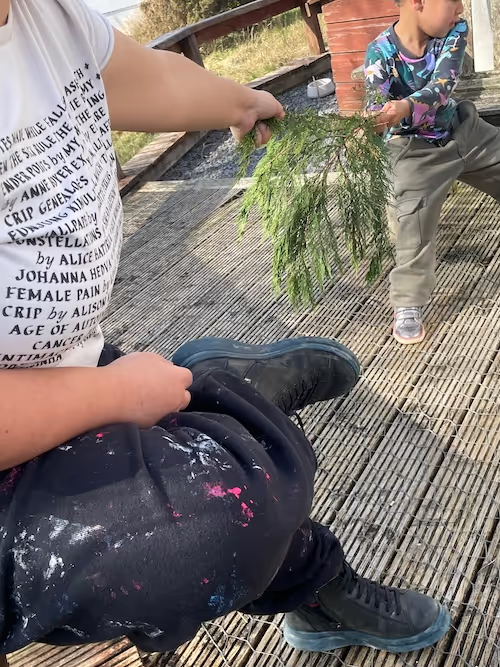
And then the record stops.

I keep hearing the echoes of my sentences. Spilling over. Like jeans. Like old genes.
I don’t want to be too tired to write. What a drag. I hate it when people’s bodies come to harm or infections get in and you ask them how they are and they say ‘it's boring’ – ‘who gets covid anymore it’s so passé’ – I hate this but I can’t put my finger on why. I – I can’t split the body who aches from the body who feels boredom. As if the aching body isn't also sick of it, as if the sick body isn’t sick of all of it too. I don’t like it cos it assumes life (upstairs life) is health, when it’s anything but. Life isn’t like a tape left running or a record left playing and then bad luck, pain or illness spin the needle from its groove. No, I dunno, I feel as if it’s arrogant to think there aren’t so many living on the B-side, like, most of the time, you know.
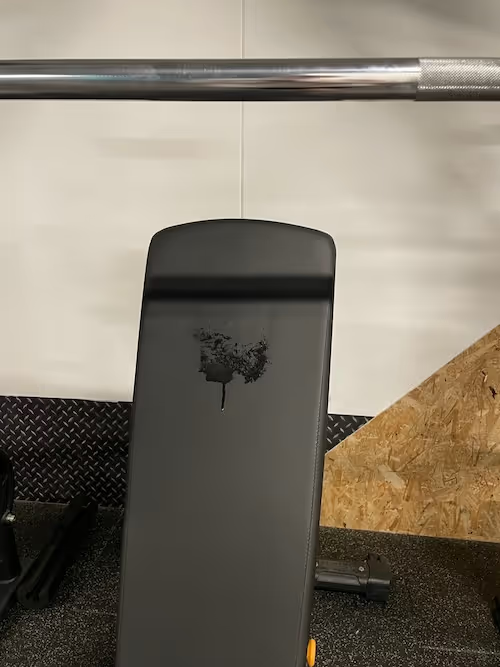
In the basement I am a rendition of all of my last acts. No one to spot me alas.
Lesser spotted tranny boy sentenced to make it up as he goes along.
Lesser spotted tranny boy destined to hit the ground running.
Ow.
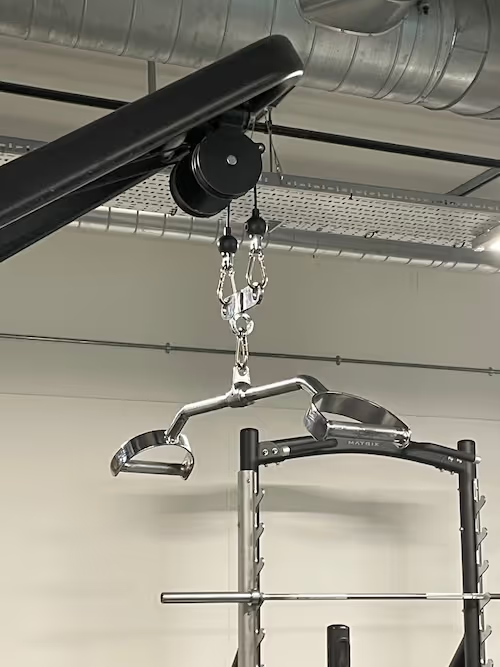
So here’s the thing. How to be trans in the gym. I’ve worked out this thing. I don’t use either changing room. Skip men’s, women’s, and the disabled which stinks to sin. I stand by the lockers on the gym floor, take my top off real quick, slip my vest over my sports bra. I’ve worked out this thing where I stand by the open lockers opposite the leg-extension machine. Empty. Here’s hoping. Face the lockers ’n’ strike my jeans off! Crotch to the swinging brass padlocks in my M&S plaid. If you saw me, no you didn’t. If you caught a flash of flesh, no you didn’t – ‘I’m sorry you must have me confused with someone else’ – what breasts? Trick of the light. What sanitary pad?
I was laid out, so I was.
A patient, so I was.
On a table. Waiting.
Singalong if you know the words
some body’s sins but not mine.
I did not see the surgeon’s knife. No
one
to spot me alas.
There I was.
A rock and a hard place so I was.
A steel piñata, Damocles over my head. Give me unforgiving metal. Give me the sound of weights lolloping in chalk dust like austere steering wheels about my feet. The thud of rubber j-j-judding up my legs.
The day I -------- why men -- to --- --- I had to wait a good 5 minutes to get on the bench. When the guy got off, I nodded at him and took my position. I lay below the bar all calm, enjoying the feel of fake leather on my back. I pressed my shoulder blades together and curled my fingers around the metal shaft. I felt where the steel had been shallowed out in the middle and settled my hands there. I noticed my new callouses and how they rhymed with those of the machines. ‘How’d they do that?’ I thought. ‘How’d they create the little hatched nicks in the metal? It feels good to grip there. Wonder what kind of instrument was used to make those lines, what immortal hand or eye.’
I was laid out like a patient. Remember. Etherised. Remember. On the table. Remember. A------- s---- f----- b---- n--- m--- ----.
I know why men go to the gym now.
And I am safe in that knowledge. I keep it warm. I sit on it like a snake coiled round an egg. I didn’t know before but then I did. The knowledge came to me in a flash.
Is that how innocence gets lost? Is that howcomes you can never get it back?
It is enough to know that I have felt it once. In certain lights I am these men now. I share their body’s knowledge. It is dumb but I keep tryna get the feeling back from the day I found it out. I guess that’s the junkie trap. I can never hit that first truthful pump.
O man. It was a cool slice of air whistling through me, opening me up and opening me out
the day I got why –
men I – was laid out like — on a table.
Jesus died and I pumped the bar. Jesus died so I could thrust the bar. And that’s when the madness occurred. This coolness began to course through me, caressing the muscles under my skin. It was this mmm yeah feeling. I can only express it as this bottomy feeling!
I was bottoming for the Crouch End Pure Gym basement roof. I was giving myself up. No two ways about it. No two ways about it, man! I was bottoming for – Christ knows – maybe Christ?
I brought my body up to the bar. All the way up and then down. All the way up and then down.
And the feeling was working it out inside me. I wasn’t working out, I – I was being worked out. Like a problem coming undone. The feeling of going there. Of taking myself there. Of shedding skin, going under and being brought back up. Blissful Surrender. Of giving it all up. Of losing it all and getting something back. With no shame. It wasn’t like being with a femme. No, like, when I bottom, those times when I have bottomed, like a good switch. It wasn’t like being with a femme. No, it wasn’t nothing like that. But kinda. Less conscious of gender, weirdly.
On the bench it was just me, where the signal doesn’t reach. But it wasn’t like masturbation. No. Because if I’m honest I wasn’t the only one there. Pure feeling was behind me, pushing me up. I was the glue in a demonic Pritt Stick. The force wasn’t in front of me. Not in front of me at all. But above and below.
I guess I was being held in serene place by physics. I was exactly what I was making my body do.
I guess this is what they call the beauty of maths. How maths is music really; have you ever heard that? I was exactly relative to the force and exertion I was driving out! And the loaded weight that was bearing down on me. I was equal to its power and flush with my limits.
I was making my body.
On that day the weights clanged down. My surroundings were re-rendered. I took in the men around me as if I was seeing them for the first time. These big, beautiful, various men grew pixel by pixel around me, all so chronically absorbed in their movements. And that’s when I realised it – that’s when I clocked why men really go to the gym.
To bottom for machines.

Carapace

Don’t talk (put your head on my shoulder)
If anything it was the gentleness that did it.
Gentleness like a Beach Boys’ song.
Gentleness like no Beach Boys’ song.
In morning’s field I hung my bag from the wooden sculpture. I kept one eye on it as it dangled loose off a sharp corner. A protrusion with no point. The point is the experience. Journey = destination. Duh. The point is we are all in it together on this residency. We five? six? (I’m no good with numbers) make a circle and L begins to recite the heart chant instructions from a piece of paper that blows ragged in the wind. The noises begin, from chests and guts and pelvises and wombs and bellies and unmentionable places.
Her hand finds my shoulder.
The touch of it makes me want to throw up. Not there. Please. How is it always too soon with this injury? Still? It’s been years. Actual years.
Won’t she grip the nape of my neck fully and with force? A whack I could stand.
But how do I say what I need without breaking the covenant of the chant?
Being trans and crip means having to over-explain everything.
It’s all so clumsy.
The self splits.
‘Say something, you need to say something. This is unbearable. It’s not personal. Lovers don’t even go there. No. Don’t make a scene. It’s embarrassing. This isn’t the time. This is exactly the time you moron! You’re on a fucking crip retreat, everyone will understand. She, of all people, will understand.’
Don’t talk
Go on. Break off onto uncertain ground.
It is still morning. Let the peat catch you without sound.
Hollow caverns of twinkling stalactites stretch for miles under my wrong feet.
Listen
Listen
Close your eyes and be free
I am dizzy. I need out.
And I do believe the body caws to be revealed by any means necessary.
I crash out. I break from the circle without saying anything. The chants continue, loudly, and someone takes up my slack. They close the gap where I fell out like a stitch. Like blown lines on a first tattoo.
Relief is how I feel. Free, but sort of free like when you get the sack? So much time but in a weird way left out with no money to see anyone or do anything. Time spread out like a patient ----------- on a table.
I kind of hate it, this unplanned wandering from the pack. Although it has, I suppose, defined much of my life.
I couldn’t give my body what it was hounding me for in that moment. Yes, I do feel shame for that.
Blades of a motel fan stopping half a minute after the power’s been cut out, that’s how her hand felt resting on my shoulder. The quiet of it was a screwdriver. The way her hand slowed all the way to an understanding – how she bore a bloody hole for the old pain to whistle through.
Damn did I NOT want to look through the hole her softness had made.
Her understanding made me visualise caves.
E Dsus2 A/D
E Dsus2 A/D
E Dsus2 A/D
Her understanding made me sick.
E Dsus2 A/D
I’m thinking.
E Dsus2 A/D
What was I so afraid of in her touch (mandated by Oliveros on the bog)? Recognition. Yeah. It could have been that. Iarlaith offered me a kind of mirror. And I bolted for the hills. But I also didn’t know the rules. I didn’t know how to translate my needs in the moment? (bleurgh) I didn’t see it coming. The urge to bolt. I was all belated again. Language failing, dramatically, out of its dress: like a diva. Didn’t know what I needed until I needed out. And I didn’t know how to tell anyone cos we were all tryna do a fucken heart chant. My back is fine. I broke it but that was forever ago now. No honestly. It’s fine. Has been for years. I just, I just don’t like it being touched.
I get weird when I see Rai in bed in the middle of the day sometimes. I spout the kind of bullshit I know is bullshit even as I am saying it. ‘C’mon babe, time to get up now! Carpe Diem,’ or something priggish like that. Ick. (I hate that word, feels deflective somehow, as if the icked don’t ick themselves out.) But yeah, I guess I get the ick when I see Rai in bed in the middle of the day. And I'm not stupid. I know I want Rai to get dressed so badly because I am terrified that if I join her I won’t ever get out. I scapegoat the part of myself who yearns for bed, who gravitates towards that place of darkness with everything I've got. I consign him to the fringes of my soul. I run from him. I exit the heart chant with no explanation.
When I was little I equated the duvet with death kind of. Cos my ma said you could suffocate under a heavy duvet if you didn’t leave a gap for air. I used to crawl under the duvet and invent funerals. Death by self-swaddling.
I know I am missing out on smth, in pushing him away like this, the girlboy still under the duvet. We could be so happy baby if we wanted to be. My loss. I know. But hers too maybe. Take a sip of what ails you.
It’s to do with masculinity. Duh. That febrile urge to run from gentleness is all masculinity. It’s like how Pedro rushes and bites me, always on the hip, cos he wants the hug but he doesn’t know how to ask for it. A bite is affection too. Being chased is intimacy too. Tenderness and violence sort of simultaneously you know. ‘Find me,’ he says to me, rushing in the park, bowing before trees and looking for acorns. Pedro is now an owl. Now a fish. ‘Find me daddy,’ he giggles with the sun in his eyes, slipping with my name in a way I can’t deny the niceness of. It feels nice. ‘He loves nature.’ Says my ma. ‘But of course!’ I say. ‘He’s about nature.’ The way Taey is about forests. The kid is about nature. He just is.
Why did you separate me from the earth? Anonhi says. And she sounds like Genet.
What God?
Find me daddy.
In Jean Genet, violence is honest and sensual; it is gentleness that is painful and confusing. For Genet, a gentle God is a tyrannical God. And an angel, a truly terrifying proposition. ‘And I, more gentle than a wicked angel,’1 Genet cautions.
I wonder what would happen if I let the scapegoated her/him inside of me, the one that wants the bed so bad. What would happen if I said, ‘alright, this once,’ and let her/him climb in with me. Would we have sex or just cuddle?
The Scapegoat
Courtney Love is the scapegoat
Joan of Arc is the scapegoat
Amy Winehouse is the scapegoat
Brandon Teena is the scapegoat
Caster Semenya is the scapegoat
Whitney Houston is the scapegoat
Princess Diana is the scapegoat
Luigi Mangione is the scapegoat
Trans women taking a piss are the scapegoat
Trans men taking a piss are the scapegoat
Trans women in sport are the scapegoat
Muslims are the scapegoat
Mexicans are the scapegoat
Jewish people are the scapegoat
Black people are the scapegoat
Palestinians are the scapegoat
Palestinian muslims are the scapegoat
Palestinian jews are the scapegoat
Palestinian christians are the scapegoat
My detransition is the scapegoat
My phone addiction is the scapegoat
Gen Z is the scapegoat
Black music is the scapegoat
He/him lesbians are the scapegoat
Youth and young transhood is the scapegoat
Sex workers are the scapegoat
The clocky are the scapegoat
My cock is the scapegoat
Prinx Silver’s pecs are the scapegoat
My girlfriend’s iron moral compass is the scapegoat
The glint in Erin’s eye is the scapegoat
The touch of Iarlaith’s hand is the scapegoat
Jessie’s left hook is the scapegoat
Oisin asking why? is the scapegoat
Hesse’s shoe collection is the scapegoat
Lauren J Joseph’s stunning pins are the scapegoat
Eliot’s lunacy is the scapegoat
The boy who cried wolf is the scapegoat
The wolf who cried boy is the scapegoat
The scapegoat who cried boy
is the wolf in scapegoat’s clothing
full moon. big scapegoat.
Disabled people are the scapegoat
Disabled people are the scapegoat
Disabled people are the scapegoat
Palestine Action is the scapegoat
Elbit 9, Filton 15, Scapegoats.
The poor, the fat, the migrant, Scapegoats.
Jean Genet is the scapegoat
My mother is the scapegoat
Our deformities are the scapegoat
Our rage is the scapegoat
Our empathy is the scapegoat
Our desire is the scapegoat
Our poverty is the scapegoat
Our solidarity is the scapegoat
Our killability is the scapegoat
The way we cunt is the reason we are scapegoated
The way we cunt is the reason we are goated
Our presence makes them sick
Jesus-lamb-of-God is the Scapegoat to end all scapegoats
Hot for a God who deserted him in his hour of need
Was not virtuous
did not go gently
Was not about to die for anyone’s sins
What a cross to bear? don’t put that on him
I beg
Tenderness and Violencesort of simultaneously you know

There’s this interview with Courtney Love I saw recently and it reminds me of my dead French boyfriend. He will crop up in everything I write. Because that’s just how it is. I love him. That’s just how love is. It brings him everywhere with me.
Ain’t love an albatross sometimes. No place I’d rather be.
On the red carpet of the 1993 VMAS Courtney Love is asked: ‘What do you want out of a partner?’ ‘Um,’ she pauses... ‘Tenderness,’ she replies. ‘Tenderness and violence sort of simultaneously you know.’ Love is doing the whole sixties in the nineties, homage to Marilyn, thing. Platinum hair, white dress, gorgeous clocky shoulders. When she says the tenderness/violence thing she puts her hands up and swoops one under the other like a dance move made up by The Supremes. Her gesture, and what she says to go with it, remind me of something… yes tenderness, violence, the union of opposites, dance moves, my skateboard sliding out from under me, my body going one way, my board the other. Ah! And Jean Genet. Of course. This bit from the book on Genet I am reading right now.
I found this book in the basement of a cinema in Hudson, NY, in Autumn ’24, the time I took a lot of selfies in a chair while waiting for you. The basement was cursed. Lots of rocking chairs and old VHS’s of cooking shows. Not a soul there. Evening turning away from day in a way that can feel eerie if you’re left waiting in the wrong basement. That’s where I found The Vision of Jean Genet: A Study of His Poems, Plays and Novels by Richard N. Coe.2 It is a hardback edition. I love the cover. It’s an image of Genet; not the one by Brassai, I don’t know who it is by. The publisher has transposed the portrait of Genet over itself and given it this pink and orange pop art treatment.
I love this book because Mister Richard N. Coe is as obsessed with Genet as I am – in that mystic, bipartisan, irrational way – in that bad critic/good writer way. Fanatic is one word for it. Mad, a better one. Poetry isn’t so far from madness and the devotion of the writer–reader to the writer belongs to what Coe calls ‘the unreality of the supernatural (which perhaps is simply what ordinary people would call madness)’.3
Ain’t madness an albatross sometimes. No place I’d rather be.
‘Poetry is so professionalised in this city,’ says Eliot about New York. ‘Everyone has a writing MFA from Yale. It doesn’t feel like that in London! You’re all freaks.’ ‘Maybe,’ I say. ‘But you’re a freak. And you are here.’
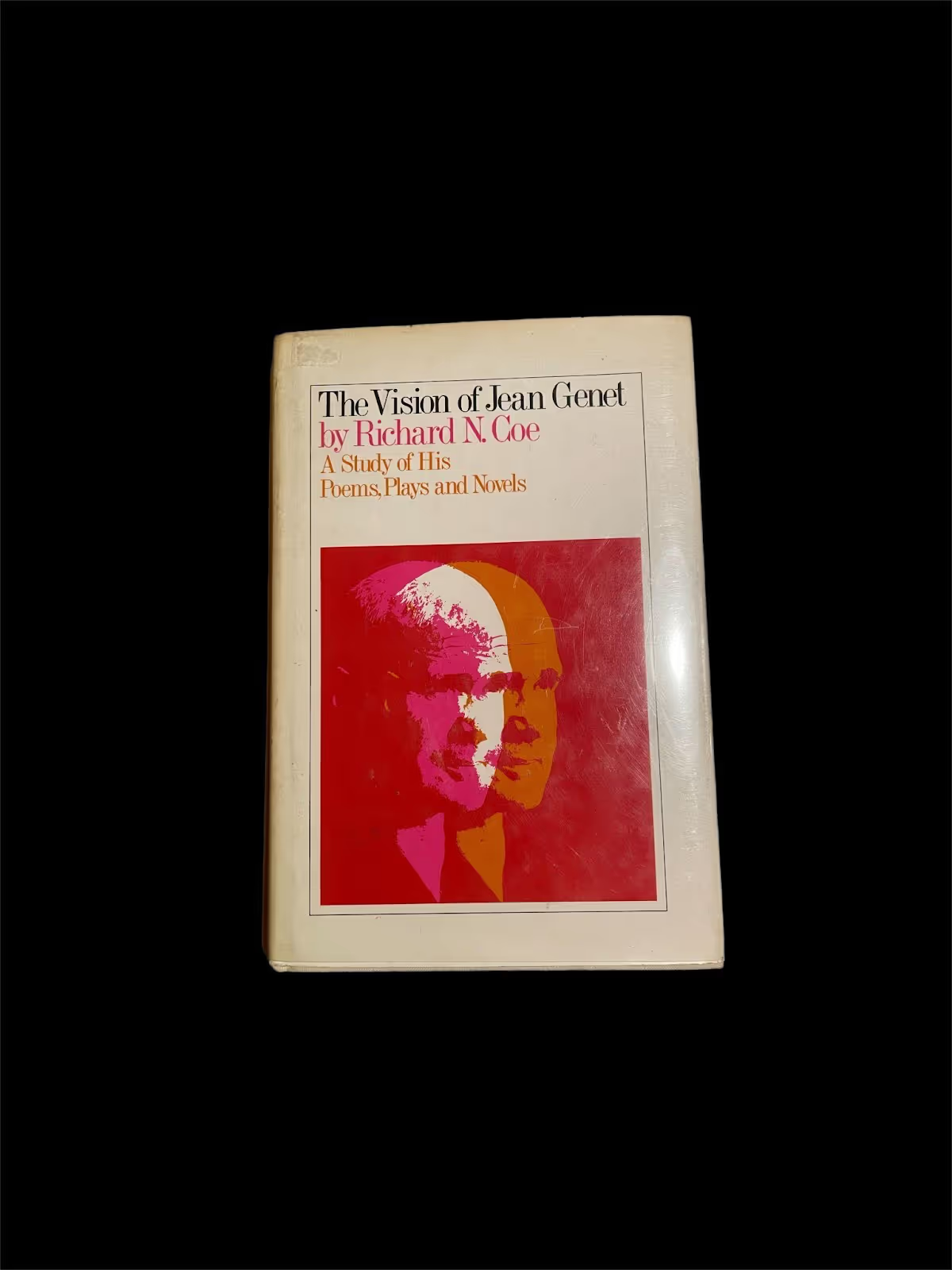
I read a bit of the Genet book with my porridge each day. On the sofa where my feet and knees poke out the end and I rub the socked/unsocked – it depends – balls of my feet against the cold enamel valleys of the radiator. I average about two pages a day. Cos the stuff is so good. I don’t wanna lose it. And sometimes when I read more than that I can’t hold in all the good stuff so it’s like holding water in the well of my mouth without swallowing and that’s hard for anyone to do. I don’t highlight the lines I like cos I don’t wanna ruin it and I did highlight it one time and immediately felt awful. Fuchsia said it’s ok if I did cos what is loved is changed (which is correct) and usually I do highlight everything cos
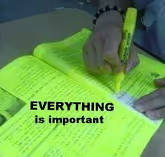
but this book is so special and good and nice to look at. I even use a postcard (Maite de Orbe’s Boy and Crucifix, 2024) as a bookmark so I don’t muss the pages. I think Genet would like Maite’s photograph.

When Maite pressed the knife to my mouth, it is safe to say my lips were hers. A photographer can’t be all forward motion. That’s a myth. I don’t buy Sontag’s phallic photographer. Not fully. The photographer trades in trust. And light. Light so soft it can’t be held. Maternal, enveloping trust. Maite is diffuse. She is not hard at all. First time I met her she was hobbled mermaid style on the bar at The Yard; a crowd of lesbians with their mouths agog like pelicans were crowded by her feet. She wore black stilettos with the heels snapped off; two serrated kitchen knives where her heels should be. She raised her ankles like a ballerina, and fed the crowd cake off the blades duct-taped to her feet. It was a moment. Maite fed. And the dykes ate. Want a split lip? That’s extra. I know I said ballerina. But seal was more like it. A velvet seal lifting her tail on an ancient rock. Grazing in full sun. Totally exposed. Tenderness and violence sort of simultaneously you know.
In Genet, violence is honest and sensual. He distrusts any display of gentleness without violence. ‘Genet’s own homosexual experiences (as he recounts them) may be humiliating, painful, exalting, mystic, disastrous – they are never “gentle”’, writes Coe. He goes on: ‘‘Gentleness’ (la douceur), particularly in the later works, almost invariably has disgraceful, even disgusting connotations. The ideal happiness in so far as happiness can be conceived – and only a child can conceive of it at all – is arid, sharp-contoured and desolate, like a desert of blue sand. The symbols of sexuality are hardness and purity: glass, granite, marble, the bright, pitiless steel of the knife. Characteristically, intercourse usually takes place in the most uncomfortable positions: at dawn, against the rugged bark of a tree, or on a rooftop among the chimneys, during a squalid night of street fighting. To this inherent asceticism, the paradoxical purity of Divine, and more particularly of Our Lady, seems to belong.’4
I didn’t get it at first. But asceticism is not puritanical. Cruising for a fuck against a gravestone is ascetic, yes. Puritanical no. Genet’s asceticism means sloughing off the bells and whistles of bourgeois hypocrisy, decrying the puritanical and eradicating anything that gets in the way of truth. For Genet, the church – its edicts and laws, its fetish for purity, its denial of the drives – is a prophylactic to truth. The silk sheets are a lie.
For Genet, the church is policed by law-abiding, spiritually contemptible, bourgeois tyrants who kill with kindness. Their gentility is not only confusing and fraudulent. It is life-threatening.
‘Jean Genet has seen too much of the evil, cruelty and contempt of so-called Christians to have much confidence in the gentle teachings of Christ. For him, the church of Christ is staffed by thorough-going representatives of the bourgeoisie – and he, the thief, the pre-ordained criminal, is the pre-destined scapegoat of a bourgeois ethic.’5
It is sacrilegious, and in some ways audacious, to continue to live within the confines of a Christian dogma (regardless of whether God exists or not) that would sooner (and happily) see you banished, exiled and destroyed. Choosing oneself, against the author of the dominant social order, is transgressive. This is what Satan did. And what ultimately got him damned. He could not make dormant his personal values, even for the God he loved so much. I think of Orion J. Facey’s The Virosexuals as well, in which the trans femme anti-hero Amygdala declares: ‘I am trans because I have chosen to exist.’6
To continue to survive in a world that wants you dead is not only hubristic, it is unforgivable. The scapegoat is supposed to die. The scapegoat is the projection of the shadow that cannot be integrated into society. The scapegoat is a mirror. A reflection. As the visibly cunt, the visibly queer, trans women are so reviled because they reflect a femininity that other women denigrate in themselves.
In her song ‘Scapegoat’, musician Anonhi sings from the perspective of the demoniser not the demon. At first, it appears as if the speaker is addressing a lover. But the softness of her voice belies a murderous intent: ‘You’re so killable, you’re my scapegoat,’ she sings. ‘This one’s a freebie for our guns.’ What does it mean for someone to be killable? To be a ‘freebie for our guns’?
In a video posted to Senator Bernie Sander’s YouTube account on 31 July 2025, Tony Aguilar – US Army veteran and former worker at one of the US/Israeli Aid Distribution Sites in Gaza – issued a testimony saying: ‘The best way that I can describe how the Palestinians reach the site to receive aid is akin to The Hunger Games, survival of the fittest, whomever can run the fastest and the furthest to get to the site first gets the aid. So those that are typically left with receiving no aid, no food, no type of aid are children, women, disabled.’ He added that ‘the sites themselves, in terms of the process for having the Palestinians leave the distribution site, was done through shooting at them, hitting them with pepper spray and tear gas, firing rubber bullets from shotguns at them. And this isn’t something that happened just once or twice. This happened every day at every distribution, at every site.’ 1,000 Palestinians seeking aid are estimated to have been killed at US/Israeli aid distribution sites in Gaza.7 Aguilar added that ‘on one occasion on the 29th of May at site number 41, with his individually assigned weapon, [one contractor] opened fire into the crowd at their feet over their heads and into the crowd. As he did this he celebrated what he was doing and he yelled, woohoo, then another contractor who was standing next to me said, “I think you got one.”’
The scapegoat is sacrificed in the service of ridding the scapegoater of a hate they cannot assimilate into their mind/body schematic. In Euripedes’ The Bacchae, the tragedy unfolds gruesomely as Agave sees that the body she has slain is not, in fact, a mountain lion at all – as she hallucinated him to be – and that the head she is holding in her hands is that of her own son. The body born of her body. Her flesh. Her blood.
Post-orgasm clarity is the most dangerous time for fags and dolls who cruise and this is when hate and violence can lethally erupt. The notorious risk involved in cruising is also what makes it so thrilling. Not everyone who cruises is gay. Or there are those who cruise who may not think of themselves that way, but this also produces a hazardous flashpoint in the event of sudden recognition.The Agaveian recognition of a latent homosexual desire that is entirely the participant’s own, born of his own ‘flesh and blood’ combined with the florid resurfacing of a buried self which cannot be fled from, is precisely the point in which the cruise may turn violent. When the shadow cannot be assimilated and therefore must be expelled is the moment where the scapegoat can become collateral. If we wanna get Jung about it we all have the capacity to switch in this manner if our shadows are not sufficiently integrated. The potential of violence, even murder, is not anathema to the human. It is within us.
Anonhi’s song ‘Scapegoat’ confronts this truth. She does not run from it. She holds it, to such a capacious extent that she possesses the ‘I’. She becomes her own vilifier; she absorbs the shock of his violence by absorbing him, and in so doing describes a complicity we all share in the scapegoating of the oppressed. Scapegoating the scapegoat will not save us, Anonhi’s song cautions.
I had a housemate at uni who got the brunt of the house’s ire. And it meant I could fuck around a bit with the dishes and stuff because, well, Hannah got the ire. But I knew, and it’s a squirmy feeling, I knew that if she moved out her ire would stick to me. Scapegoats are convenient distractions and repositories for the truths we would rather not confront in ourselves. The potential to scapegoat exists in us all.
I can punch you and take all of my hate into your body
– Anonhi, ‘Scapegoat’
‘It’s not personal. It’s not personal,’ sings Anonhi as fascist, like some bureaucrat from the hellmouth. ‘It’s just the way you were born.’ The looming irony being just how personal the bloodsport of scapegoating is. The violence meted out by the scapegoater is entirely dependent on the personal circumstances of the scapegoat; of their sex, gender, race, religion, femininity. And yet, in the scapegoater’s logic a Muslim is every Muslim. A faggot is every faggot. A tranny every tranny. The scapegoater has a hate that needs to be expelled. And that hate must find a host. It’s not personal.
‘No longer did the crowds cry Hosanna! And Welcome! Now they shouted Crucify!’8
On Good Friday in the cafe of the Barbican, my aunt Netty first told me how the scapegoat got its name. Once a year on what was known as the day of atonement, early Jewish societies gathered their community and sacrificed two goats. They drew lots to decide which animal would be given as a holy sacrifice to Yahweh and which would have a red ribbon tied round its neck and be exiled into the wilderness, carrying the sins of society symbolically on its back. It is understood that this scapegoat was also a sacrifice to demon Azazel who ruled over the godless barrenlands beyond the civic walls. It was random, which goat got the ribbon and which one died on the spot. The scapegoat is a representative of the shadow parts of society. Who he is does not matter. But exiled he must be, for he is the shadow that must be banished in order for society to uphold the myth of its own purity.
SEND THEM BACK
BACK WHERE?
IT DOESNT MATTER JUST SEND THEM BACK
Hotel riots and fires in the asylum houses. The fickle crowd turns on a hair.
St George’s Crosses up and down the country like streaks of blood everywhere.


My niece has this game. We chase each other’s shadows. In the universe of the game, our shadows have flesh that retracts in pain from the stomp of boots. Like how the horns of snails retract from hunting fingers. In the game we play outside Home Bargains, our shadows are sentient, they have a language. But they only have a language for pain. ‘Ow!’ my niece says as my foot stamps down on her shadow on the grey slabs. ‘Ow!’ I say as her feet find mine.
Another game. She sees a cartoon of a skull and crossbones motif on a playing card. She does not know the word for the image. ‘This,’ she says, jabbing at her clavicle, pressing her skin down so the outline of bone shows. ‘What’s this?’ she asks. ‘A skeleton,’ I say. ‘That’s your skeleton’ I tell her. She pauses. ‘My skeleton is under here,’ she says. Another pause. Longer. ‘My skeleton eats my food,’ she says.
We join the animals
Not when we fuck
Or shit
but when
Staring into light
We think
– Frank O’Hara, from ‘Heroic Sculpture’
You can banish the scapegoat, you can kill her dead. You can kill all her descendants. You can send her into the wilderness with a pretty red ribbon tied round her neck. You can’t see her anymore. She is gone. That’s better, keep calm carry on. Build a riviera on her graveyard. But try as we might to move on, we can’t shake the feeling something is wrong. That dead as she is, her shadow still feels pain. Her skeleton still hungers.
A Christian society that cannot countenance mystery, transgression, doubt and racial or sexual variance, is a society that scapegoats. Christianity has exiled the shadow parts of itself that it cannot assimilate into its doctrine.
Coe again:
‘Christianity, the most rational of religions, has given the world many benefits; but there is one thing that it has destroyed: it has destroyed our power to touch and experience the sacred through limited and controlled transgressions. For the older religions, the bacchanalia, the ritual sacrifices of men and animals, the ecstatic eroticism of temple prostitution, were acknowledgements of the fact that certain civil crimes might be sources of spiritual wonderment and worship. Christianity has identified all transgression with the notion of the profane and called it sin: the Christian saint can only hope to acquire his sanctity through virtue.’9
The institution of the Christian church models an impossible standard of virtue for the congregation at large. The church has hypocrisy built into its business model. Worship God by all means, but don’t overdo it, yeah? Don’t harm the church by worshipping God with too much passion. May Joan of Arc, and the sunken witches, attest. Lotta hot water that all was wasn’t it? Never knowing which witch was gonna die. Clue: all of them. Another martyr for the books, well done padre. Good work. Human life free from transgression does not exist. The idea of loving God in itself is transgressive, florid, mad. It is Godsexual. The virtue the church preaches is and can only ever be performative. Institutional Christianity is not only predicated on a fall but predestined for one. She rides for one. Legislating against darkness, taboo and transgression only fortifies the living shadow of the scapegoat.
If the scapegoat is the shadow of society, what is the biggest shadow in the history of Christianity? It’s the shape of Christ on the cross. The reproduction of Christ on the cross is Warholian. Makes you think it’s all a bit of a death cult really. The battered and bleeding body. Repeated. The holy martyr, bleeding out. Forever and ever and ever, amen.
After witnessing death on such a massive scale in the war, G. A. Studdert Kennedy, who served as a chaplain in the British forces during World War I, said he never again saw the battlefield as anything but a crucifix.10 He never again saw the world as anything but a crucifix. Siegfried Sassoon, writing in the same war, at a church in St Ouen, awaiting the frontline, issued the devastating line: ‘lost to God I seek him everywhere’.11
Genet, the outcast, the illegitimate, the motherless ward of the state, then of the child prison, knew keenly the injustices and cruelties of life. His miracles were shadow miracles. They were terrifying. ‘There is nothing Genet and his characters find more obsessively terrifying than miracles.’12 For Genet, if the miracle is sacred it is not because it is a gift from elsewhere, or divine. If miracles are sacred, it is because of their relationship to the profane.
Genet’s conception of the miracle does not telegraph a mystic otherwhere or reveal some benign paternal authority in a firmament beyond; no, the miracle symbolises the divinity of the debased. That is not to say that the debased are secretly divine because divinity is in everything; no, the miracle is realised in the debased because the debased, after being struck by the miracle, remain, after everything, debased. ‘I’ve seen too many miracles to believe in them,’ says another queen of the paradox, Oscar Wilde. The strength of the event of debasement outstrips the power of the holy, which conversely proves the essential divinity of the debased. ‘Heaven, that is the highest region in myself,’13 Genet writes. It is never entirely clear whether Genet does or doesn't believe in God. It doesn't matter. He plays at believing. He baits and thwarts the God he musters up. He remains consistently barbarous to a God who neglected him and let the abuse he suffered as a child flourish and bloom like a pernicious rose. Roses in Genet are miracles too. They are objects of terror.
They did not come for us.
The miracle is that they did not come.
It is a miracle that the craters do not bleed.
A miracle the messiah does not descend.
The miracle is that there are none. The miracle is that there are none.
Being turned in was Genet’s index betrayal. His crime was to be born without a mother into a society hungry for scapegoats. ‘My God, why hast thou forsaken me?’ says Christ on the cross. The miracle is that there are no miracles. The miracle is that he did not come.
‘Genet is society’s scapegoat: and therefore this same goodness of God, which re-assures the right thinking citizen, is responsible for Genet’s condemnation.’14 The comfort of society is predicated on his exile. The world according to Genet is built on this very real assumption. The God-fearing ‘good’ and upright French society have their values established and their power maintained via the degradation, abuse and exile of boys like Genet who belong to a shadow world, an ‘immonde’ – a ‘forbidden universe’.
Coe elaborates on this dynamic:
‘There is Jean Genet’s world of pimps and male prostitutes… the world of the submerged tenth, the people without a future, the under privileged and under nourished, the outlaws and the outsiders. And against this there is our world, yours and mine, “votre monde” sneers Genet, compared with which his own is not a “monde” but an “immonde”. This is the world of right thinking citizens, of critics and readers of the TLS, of house holders and rent payers, of politicians (with the exception of Adolf Hitler who, notoriously, belonged to the other camp) and patriots – in a word, of the bourgeoisie: the world of those worthy holiday makers who volunteered to block the highways with their cars and shine their headlights in the ditches so the police could round up every one of the herd of terrified children who had escaped from the penitentiary of Belle-Île, and send them back to that hell where they were “horsewhipped until they stopped screaming from sheer exhaustion, or died.” Genet had been one of these children – not at Belle-Île or at Eysses, but at Mettray, which was only a degree or two better, and his world is theirs, not ours; ours is the world of legality, his of the untouchable, the taboo: “a forbidden universe”.15
In the monde/immonde dichotomy, gentle God sides with a society that blithely allows child prisons to remain operational. Genet, after Lucifer, chooses himself over a sick and perverted system and a God ambivalent to his suffering, a God that sees his suffering as collateral to the maintenance of a society that favours civility over tolerance. For Coe this represents a Freudian ‘urge to desecrate, destroy and kill that which one reveres’.16 It’s natural, the urge to betray what has betrayed you. To exile what you are exiled from. To turn away from a God who sees your suffering and does nothing to stop it.
‘Unquestionably JG gets a vitriolic and malicious pleasure from associating the sacrosanct images of the Sunday school with the obscenest episodes between darling and divine – who thinks of her lovers sexual organ as “jesus in his manger”, which as Genet notes elsewhere is designed to set his reader’s teeth on edge.’17
I see the Deliveroo pick-up guys, Uber Eats drivers on mopeds outside chicken shops with their feet up on the bow of their scooter, glutes tense on the seat. Helmets resting on their sunburned crowns, arms crossed like an open casket. Phones chemical-warm in their hands. And I think of Jesus asleep in his uncomfortable manger. We had a stick-on Christ with the paint peeling off. It’s still there on the mantlepiece. Christmas all year round. You plugged his bum into a hay bed. His body is frozen in the hollow body pose. It’s the same pose I make when I read. When I come.
In New York City I see people sitting on the seats of Citi Bikes to take a load off. I see them conduct their phone calls of love and antagony while propped between two stationed Citi Bikes, feet resting on each pedal, bellies flopping but cores engaged, bum cracks peaking, wriggling with an effort to remain sitting on the cushioned seat. I’ve seen some people take naps this way, mouths slack with sleep. There just aren’t benches here. And businesses don’t want to encourage shelter. So hollow bodies are forced to improvise on the city’s furniture/make sofas from slot machines.
They know not what they do feels like kind of a reach. Don’t you think? Who among us can say we didn’t know?
The dissenting angel
When Stormzy fucked over Palestine for McDonald’s I deserted him. The Stormzy I love wouldn’t do that. It is in allegiance to the Stormzy in Stormzy that I deserted Stormzy. Because Stormzy left Stormzy first is how I see it. And it still hurts tbh. Oisin can see it in my face whenever it comes up. It’s how my sister’s first bf would look when arsenal lost. Same. My sister’s first boyfriend’s first and second names rhymed, which made him come off like some kind of cartoon hero. He’d ‘wake and bake’, which rhyme too, and once he spent his whole inheritance on jeans.
This year my friend Foivos, who writes scripts, asked me to play Satan in a film adaptation of Rimbaud’s A Season in Hell. I grew a goatee and everything. Ok I already had the goatee. But now it had a point. Ba dum bum chhh. The film was in Athens and I spent my days with my feet in the Aegean listening to podcasts about the many circles of hell. I met Batool in London through my friend, they’re lovers. We talked about Lucifer at the picnic and my reticence around the role. ‘Big shoes to fill I dunno?’ I said, half-lie. What I didn’t say was that I’d become kind of fixated on the devil as an adolescent in a superstitious way after a bad trip in my early teens. He kind of hung around as a spectre in those years and I was daunted to play him cos of this. Maybe cos I was worried that my teen devil would return. That I would somehow call him up by playing the role. Not that there is one devil. But you get me. ‘One starts with a little superstition and then falls into the arms of God.’ That’s Genet. And superstition and I have always played well together. I never told anyone that, about the devil thing. When I tell Batool, who knows a thing or two about Satan, about the film, they say they love Lucifer, that he’s misunderstood. ‘This is just what I need!’ I say, seizing at anything that might help me with the part and with my anxiety about it. ‘He’s a total loverboy,’ they say. ‘He was framed.’
A few days later they send me something to read. It is an essay about Ahmad al-Ghazālī, a Sufi master from the late 11th and early 12th centuries who taught that ‘whoever does not learn adherence to Divine Unity from Satan, is an unbeliever’.18 Ghazali believed that Satan loved God too much to do his bidding and bow before Adam, a creature made of clay. Satan believed in the ‘Tawhid’, the adherence to one God. Like Joan of Arc, who could not relax her principles, Satan could not bend his faith in oneness. He was expelled for refusing God’s whip. In the essay it says: ‘Satan’s refusal to bow to man is thus a deep expression of sincere monotheism and hence of pure love.’19
In the film I had 40 naked Athenians behind me, I wore a green body stocking and it took Teo, the make-up artist, four hours to paint my face. They attached four papier-mâché horns to my forehead which I sweated off multiple times during takes. The make-up artist cursed the director for doing the close-ups last. ‘Amateur!’ they muttered. Teo’s breath smelt like cold coffee stirred with the butt of a cig saved for later. You know how you can smell it when someone tamps it to get on the bus. When I smell the inside of people’s mouths I can’t get over how intimate it is. Like, buy me a drink first! Teo had got into make-up after a doomed foray into farming. They’d started a course in agriculture. But the moment they sat down to commence a module on tractors they realised they were far too much of a faggot for that shit. I guess it’s the shit we choose, isn’t it. If we are in a position to choose. And sometimes the shit chooses us. Teo told me about how in their small farming town in rural Greece there were no gay people, ‘but the heterosexuals do a mighty good job of bumming each other after dark in the forests and woods to make up for it’ they laughed.
To play Satan I wore a jacket made from three pairs of leather trousers. Several crotches fanned around my head. I looked like a gecko or Elizabeth I. I wore two jockstraps, one of which was made out of the beak of a black Covid-19 mask. To get into the ensemble I needed Dia, the costume designer, and her assistant Katerina, to strap me in. It took some time to hoick up the sleeves and work out exactly which bit went where. When after much human-abacus work I was all corseted up and strapped in, this unholy need for a wee set in. ‘You must be fucking joking,’ said Dia, mad. ‘I can pull it to the side,’ I said. ‘Don’t worry! Look, I can just pull the jocks to one side! And the body stocking has no crotch! It’s all good,’ I said, clomping urgently towards the bog. ‘Mind the cockroach!!’ Dia yelled behind me, pins in her mouth.
My Satan was a lord of the dungeon. A devil among deviants. ‘More scary but don’t lose the camp’ was the only note the director gave me. I would have found it hard to be him for more than one scene. Cos Satan’s alone. And its heart camp, well, camp is just tragedy.
And I remembered the hell of it. The thinking hell. And the feeling hell. The total hell of it. The feeling like the self I knew had deserted me. The feeling, not separate from God, which is the definition of sin, but separate from myself. Still exists somewhere, this time. Christ on the cross I’m glad it was just one afternoon. I could tell you how I didn’t mind dying cos I already died. I could tell you how I saw the dying as arbitrary cos I already died. I just needed to figure out the how of it. And I thought about the how of it all the time. Couldn't sleep for the how of it. And my scaredness of the how of it made me hate myself. I went to see her one night. The night nurse. She was eating something good-smelling from a box. Something hot and oily. I life’d and death’d, or tried to. It was so hard to get it out. And she looked at me through the eyes of the well. ‘[Girl’s name] I have never known a situation that was permanent.’ She wore a silk headwrap patterned with bright flowers, red and blue. It wasn’t what she said, which was this too shall pass in another guise, no; it was her voice and her soft belly and the surety of warmness from the box in front of her, the smell of hot and sour food and the way all this became one thing. One solid thing. One true thing. It told me I was not the first to come to her in the night with thoughts of death. And I wouldn’t be the last.
Moses: ‘Your external form has been transformed from the angelic to the demonic.’
Satan: ‘This is only a state of the moment which is transitory and will change again.’20
I sang Bobby Womack round the abandoned observatory using a gnarly staff as percussion. Looked like a single nik-nak that staff. We talked about the difference between happiness and pleasure and stared into the pit. Or I did. But you had known other pit-starers and knew how to stay nearby one. When you left I barely noticed you’d gone but I beat the staff all the same. I played the iron railings like a ribcage. Like a xylophone. And I beat the bounds of my scapegrace mind. Still don’t know where it ends. Any ideas? I’m serious. I want to know.
What are the parameters of exile? And how do you measure the night?
Normandy. I write ‘Normandy’ all the time. When really I mean the time aged 7 I was in Normandy holding my dad’s hand and I thought how my mind transcends the walls of my skull. Like I can think down the road. I tried to explain. I couldn’t really. Conversation moved on. But I never have. You don’t understand. I never have moved on. Normandy has become a shorthand for this index memory. Normandy everywhere in my margins.
I wrapped myself in a blanket and lay at your feet. I was sliding.
Only recently I asked for more. Please ma, can I –
My ma was sent to a Catholic convent aged 7. She was sent away from home to live with strangers, to live with nuns. She had to be ferried from the farmhouse, where she slept, to the convent every day to learn. One day she missed the bus. One day she said she didn’t believe in God. The days, well they added up and one day she was expelled. The nuns said she was unteachable. A bad example. She could not stop herself from asking why. The day came when she was sent away from the place she was sent away to. But this time being sent away meant being sent home.
I have always been proud of this knowledge of my mum.
She got expelled a lot. She couldn’t stop being who she was and was scapegoated for it.
I carry it with me, this knowledge (ain’t love an albatross) and it says something about me too. There is something in my waters. That says no. That refuses. That wanders from the pack. Or this is what I like to think anyway. But maybe believing this about myself is a subscription to a certain dogma too? A belief that I am from a nation of people who ask why. We all tell ourselves stories to get to sleep. But no. There is something to it. Ma said no. Cos her dad said no to his dad. And I didn’t know but my dad’s dad also said no. Was also expelled for love. For loving a boy.
Those who transgress, like scapegoats, are often expelled or find themselves with little choice but to run away. ‘The violator of taboos is himself taboo; in primitive societies; he is untouchable, a being apart; he is possessed, the demon is within him.’21
John Berger got sent away to boarding school and said he always felt like an orphan because of that. At sixteen he ran away from boarding school to London and ‘found a way to live’. He visited his parents at Christmas time. In his last collection, Confabulations, he tells this story about his dad: ‘When I was 18 I asked him to pose for me and I painted his portrait. When he was a kid he had wanted to be a painter but was not allowed to be. But he kept as a souvenir a painting he had made on a metal plate, a painting of some dahlias, and for me, as a kid, this painted plate was a kind of talisman.’22 Even though he didn’t become a painter. And the plate was the only thing about his dad that attested to his desire to be one once; the plate was like a shining nudge, an ‘it’s ok’ to do this. I feel like my ma’s rebellion was this for me; permission to wander. My ma denying God, stories of how she once took a Jaguar she’d never buy for a test drive. Stories behind veils. Was there a crash in a public loo? My ma against God. That’s how I saw it. And this notion of my ma against God was like Berger’s plate for me. A talisman. I know it’s not the whole story and I think I always knew that. But we all tell ourselves stories to get to sleep.
Other words my ma has forgod
Other words my ma has for God:
Hooey Johann Sebastian Bach
Baloney
Cobblers
Bogus
To be who you are, against God, is Satanic.
Satan turned from God because in order to remain unified, in order to practice the Tawhid, he could not follow a God that he knew he could not both submit to and obey. He had to be what he was. He had to leave. I imagine the pain felt by Satan turning from God isn’t so far from the pain that theologians talk of Jesus experiencing on the cross. He did not go gently. He was experiencing for the first time the devastation of being abandoned by his father. Of separating from his God, himself.
‘In a true sense of the word Islam (submission), Satan is a Muslim because he submits totally to God, his Beloved… Satan is a lover of God and perhaps the true lover of God because he loves him regardless of all the suffering and pain that he has to endure. But there is still a question, if he was a true lover, why did he not completely succumb to God’s command and refused to prostrate before Adam?’23
Because he could not be what he is not. He could not be dual. He could not love God and love Adam. The way I see it, Satan’s devotion to God was so strong, his being could not bend to a command he perceived to be at odds with his God’s will. He was left with no choice but to thwart God in order to remain true to God. ‘Thwart God and here we have the key to Genet’s attitudes,’ writes Coe on Genet; ‘and to divine and darling… they are at death grips with God, because God offers them sanctity and salvation on his terms. And they are tempted but they will not be bullied. They are human beings and they have one inalienable right. To be what they are. God would take away this right – so they defy God. The tax is too high. The tax of turning on themselves for God is too high. So they defy God.’24
Satan will remain Satan in spite of God’s command. He leaves because staying would mean being destroyed, whipped, gentrified. The Satanic paradox is that Satan is arguably God’s best disciple. God needs beings as they are. Because their oneness (atonement) lies in being true to their god-given natures. Which is why homosexuals must be gay. Despite the hackneyed versions of Christianity that preach fag death, being gay is not a sin, quite the reverse. Coming out is at-one-ment in the truest sense; it is defying the church in service to the whole. And yeah i know #notallchristians. But many adhere to it, all that fire and brimstone crock.
My ma couldn’t abide by it either. She never could tell a lie. So she defied God. Ran rings around the nuns. Her words not mine. She raised an eyebrow to God’s federal constabulary. His benevolent servants on earth. She just couldn’t join their league.
More still, and forever, is my ma in league with nature. The wild. The world. She can’t wait for my nature period. I write too much about sex for her liking. The Catholic guilt I inherited from my ma, and my ma’s ma, is in my blood and like her I will never stop running away. I will never stop getting expelled. I will never stop running from the lead weight of the duvet, from the feminine hand on my shoulder, from the invitations to my own funeral.
Please Ma, may I – peel back the curtain.
Before I knew more I imagined you stood up. Bathed in light. Righteous. Bold as a cardboard placard. I DO NOT BELIEVE IN GOD. But your expulsion was sadder. Mildewed. Which makes it more… I don’t know. Poignant I guess. Because we don’t want to have to think of mad as sad or lonely so we think of mad as close to God. And I can’t think of my ma scared and lonely and confused, a child betrayed at the farmhouse, so I think of her as the soothsayer. But it was because she was cold and alone and betrayed that she was bathed in light.
‘The miracle consists in the bread remaining bread, in spite of the spiritual experience’.25 The failure of the miracle is the core of the miraculous.
My nephew Pedro, like his grandmother before him, has a healthy distrust of authority. Pedro, as a child of three, needs people in ways most of us would find completely terrifying. And yet he has two weapons in his arsenal. The power to say no. And the teeth in his mouth. Both of which he uses liberally. Pedro is the scapegrace who rips the façade. Childhood. I would call it infernal if it wasn’t so sad and lonely. So, we call it close to God because it is so sad and lonely. Knowing how tayly it all is.
Tayly (adj.) (family word): meaning pathetic.
The scapegoat is born of grace, poetry. And poetry is never not going to be about absolutes and poetry is never not going to be pathetic. Gayness is pathetic. Belief in anything. Pathetic. The pathetic, the hopeless, the transgressive and the profane, are how we recognise the divine and how we access that ‘highest region’ in ourselves, the heaven of ourselves. As Coe elucidates, ‘Le sacre is reached, firstly through any experience of the absolute – of cruelty, evil or degradation, but equally of beauty, poetry or light – and secondly through the violation of taboos.’26
The sacred and profane are always in concert, swirling around the flashing plate of impotent miracles. Dancing, wrestling, gurning. Dowsed.
I will write about Kat one day. Kat on a hot tin roof without her legs. Free from the lie of virtue and brimming with rage. Swinging grotesquely out of time’s arrow. In dawn which is apart. In dawn which is apart they said no to all this. Made way for cliffs.
I do believe the body caws to be revealed by any means necessary.
AS IF VIRTUE
HAS ANYTHING
TO DO WITH THE DIVINE.
As if sanctuary
means anything
without wilderness.
I want to
explode
into
a
million bits.
All conscious.
– Edmund White
The intimacy of violence

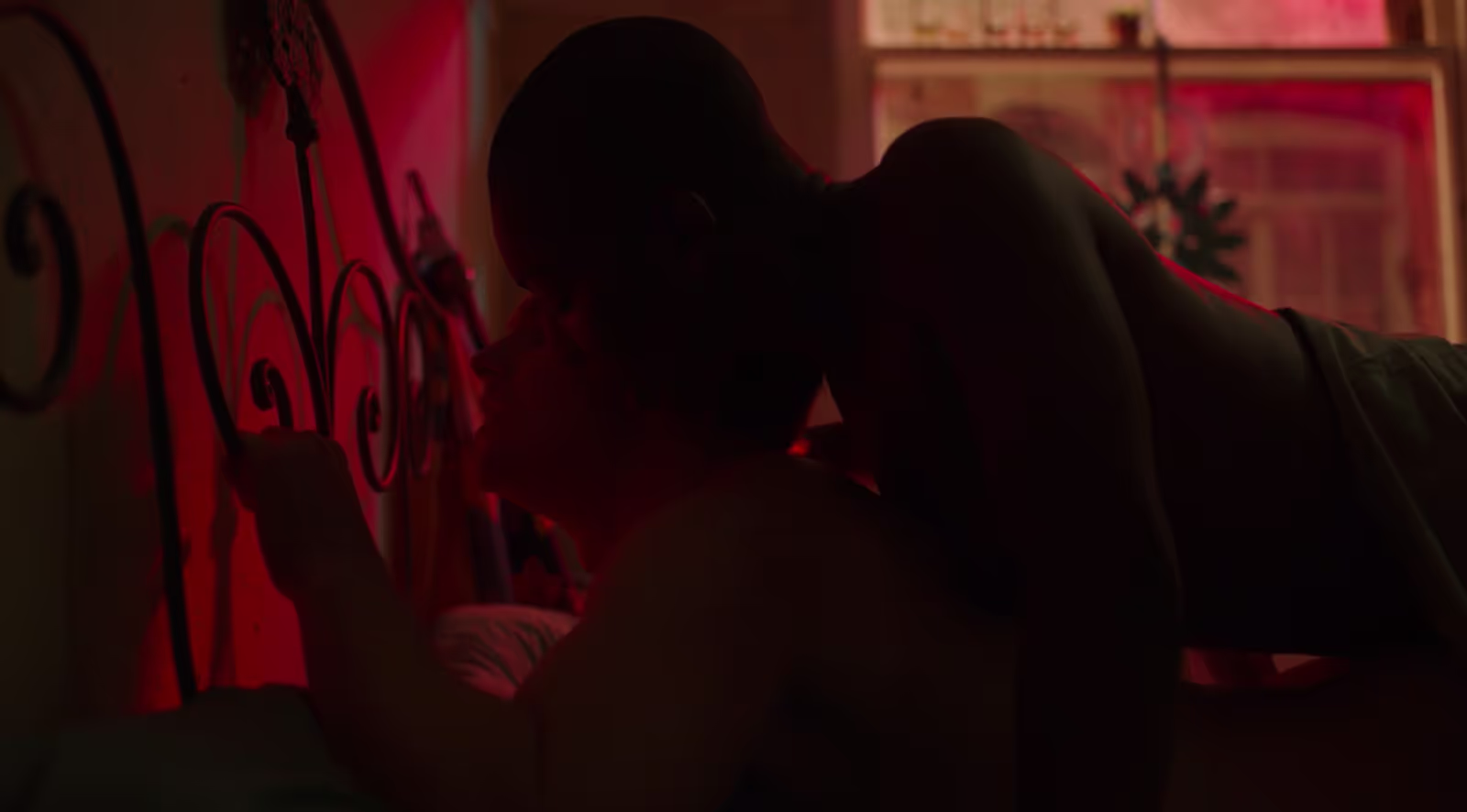
Love, in its true nature, is but an affliction (bala’), and intimacy (uns) and ease are something alien to it and are provisionally borrowed. This is because separation in love is indeed duality while union is indeed oneness.27
There is this specific scene in I May Destroy You. In it Michaela Coel is fucking her rapist so fucking gently. It is horrifying.
To give love like that. How inspiring.
Loving God, and maybe being Christian – I don’t know anything about that, my religion is Sinéad O’Connor in a dog collar ripping an image of the pope in two – is a transgressive act in itself. It is transgressive to love God.
To give love like that. To love God like that. What would it take? It would take the faith of a dissenting angel. Michaela Coel was raised Christian until she met faggots she liked and was like, hang on. This shit stinks
Like Lucifer who loved God so much he turned his back on him.
Like my mother who denied God aged 12 in the convent and was expelled for it.
Like Kat.
Soft resistance, my friend Deen calls it. And the goosebumps prick. Oh, if I could fuck you with my many rising pricks but they fall down so easy. Keep my heart open. Before the garage door rolls down. Before the sash windows bow and break. So I can fuck you with my million tiny gooseflesh pricks.
I can’t stand even the memory of her hand on my shoulder.
‘wild how she had kurt killed’ writes one commenter on Instagram under the video of Courtney Love at the VMAs.
‘She was one of the first people to say anything about harvey weinstein’s predatory behavior towards women and she got blacklisted bc of it,’ writes another.
Love thy scapegoat. 11th commandment.
Do you understand how much gracepower the scapegoat has? To have that ribbon tied round her neck and walk alone into the wilderness to find only death and damnation in the desert.
I heard one person in Palestine say they wouldn’t leave even if they could. Because they don’t wanna live anywhere Palestine isn’t. Because Palestine is the truth and the world that has left it to die is no place they ever wanna live. I would rather die, they say. I would rather die.
And Sassoon says it too in the war. (Oisin Oisin, hi, how your voice gets in. How all my friend’s voices get in. I am so porous.) And my goosebumps are rising, come quick. Let me in. It was Sassoon! His name is all over my pricks. Come let me in. Ahh too late.
He says the only place to escape the frontline is the frontline. It is the only place that makes sense.
Palestine doesn’t need to be freed. It’s the rest of the world.
Even God fled God on the cross.
Jesus died and my knee dislocates. Again and again and again and again.
Who’s up for break-up karaoke then? Bottled water and grenade bars on me.
We will find someone to sit the baby.
Load up ‘Gloria’! Fuck it.
As if I’d be free of my unruly knee. It keeps me humble. It keeps me genuflecting for a God I can’t see.
- Jean Genet, Our Lady of the Flowers, from an excerpt published by Grove Atlantic at https://groveatlantic.com/book/our-lady-of-the-flowers/.
- Richard N. Coe, The Vision of Jean Genet: A Study of His Poems, Plays and Novels (New York: Grove PressInc., 1968).
- Ibid., p.59.
- Ibid., p.55.
- Ibid.
- Orion J. Facey, The Virosexuals (London: PSS Press, 2021), p.57.
- ‘Former U.S. Special Ops: What I Saw in Gaza | Sen. Bernie Sanders’, 31 July 2025, YouTube, www.youtube.com/watch?v=uKpkZNAFwkc.
- John Young, Christianity (London: McGraw-Hill, 2003).
- Coe, The Vision of Jean Genet, p.38
- John Young, Christianity (London: McGraw-Hill, 2003). p.31.
- Siegfried Sassoon, ‘The Church at St Ouen’, in The War Poems (London: Faber &Faber, 2012).
- Coe, The Vision of Jean Genet. pp.33-39.
- Genet, ibid., p.57.
- Coe, The Vision of Jean Genet, p.57.
- Ibid., p.22.
- Ibid., p.56.
- Ibid.
- Annemarie Schimmel, Mystical dimensions of Islam (ChapelHill, NC: University of North Carolina Press, 19751975), p.195.
- Ghorban Elmi, ‘Ahmad Ghazali’s Satan’, in HTS Teologiese Studies / Theological Studies, 75(3), November 2019.
- Ibid.
- Coe, The Vision of Jean Genet,p.39.
- John Berger, Confabulations (London: Penguin Books, 2016). Extract sourced here: https://tinyurl.com/3s44fez5
- Elmi, ‘Ahmad Ghazali’s Satan’.
- Coe, The Vision of Jean Genet, p.59.
- Coe, The Vision of Jean Genet, p.51.
- Ibid., p.39.
- Elmi, ‘Ahmad Ghazali’s Satan’. p.4.
D Mortimer
D Mortimer is a writer and artist from London interested in the crip unknown. Their first book, Last Night a Beef Jerk Saved My Life was published by Pilot Press in 2021. Mortimer held a Techne scholarship in trans auto fictions at The University of Roehampton—where they completed their doctoral project, The Beef Journals: Naming the Uncertain in Transgender Subject Formation. And their monograph Speed Glum Hero (2024) has just been published by Sticky Fingers Publishing.